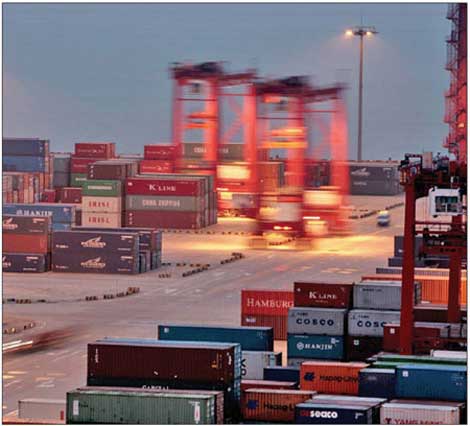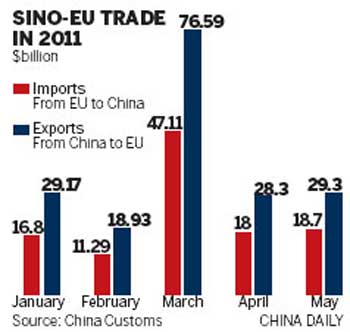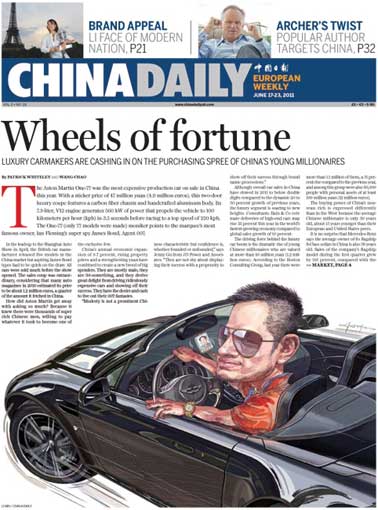China demand to boost EU trade
Updated: 2011-06-17 11:56
By Zhong Nan (China Daily European Weekly)
 |
|
Shipping containers are loaded at the Yangshan port in Shanghai. China's trade surplus stood at $13.05 billion in May. Kevin Lee / Bloomberg |
Import growth in May jumps 28.4%
China's trade surplus with the European Union will narrow in the next few months as the nation is raising its demand for European goods and adjusting its economic structure, economists say.
Bilateral trade between China and the EU grew by 21 percent year-on-year to $48 billion (33.4 billion euros) in May. But China's trade surplus with the EU in May shrank by 12 percent from a year earlier to $10.6 billion, as exports slowed and imports growth quickened, according to the General Administration of Customs.
Exports to the EU grew by 13 percent from a year earlier to $29.3 billion last month, while imports from the EU surged 35 percent to $18.7 billion.
 |
"China's outbound shipment performance in May remained relatively stable. But the nation's demand for European commodities, such as manufacturing equipment, electromechanical and high value-added products, is stronger than expected," says Zhao Zhongxiu, a professor of international trade at the University of International Business and Economics in Beijing.
Zhao says it was expected that trade figures with the EU would slow down in May, because of a shrinking demand from the European nations, which are showing a number of negative signs in their economies.
The Chinese government's tightening policies adopted last year were also expected to have an impact on the bilateral trade, Zhao says.
Du Yingfen, a senior researcher at the Institute of Industrial Economics of the Chinese Academy of Social Sciences, says rising labor and raw material costs, coupled with a stronger yuan, have contributed to the slowdown in China's exports to the EU last month.
"Chinese enterprises are incapable of influencing prices in the EU market, as the majority of goods exported to the EU are labor-intensive products," she says. "China also faces intense competition from other low-cost countries such as Russia, Indonesia, Vietnam and Brazil."
Li Quan, deputy director of School of International Trade and Economics at Peking University, says the power shortages that erupted in March slowed China's export capacity. The nation's exports have been affected by the reduction of industrial output.
"China is at a peak period for energy consumption. The shortfall in coal and oil supplies shows the country needs to put more efforts to balance the gap between electricity demand and supply for foreign trade," Li says.
China's net coal imports declined by 13.56 million tons, or 27.2 percent year-on-year, in the first four months of 2011. Rising international coal prices, about 100 yuan (10.7 euros) more for each ton compared to domestic prices, are the major cause of the decline, according to the bureau of economic operations adjustment of the National Development and Reform Commission.
As the nation's inflation rate remained at 5.2 percent during the first five months of this year, the Chinese government has taken steps, including raising the interest rate and required reserve ratio, to cool the economy and to curb the bubbles in the property market.
Zhou Shijian, a senior trade expert from Tsinghua University, says the demand for EU commodities will remain steady this month.
"Export growth to the EU will also remain comparatively stable in the months ahead, considering the coming new wave of orders from the EU for the Christmas holiday," Zhou says.
In the first five months, the EU remained China's biggest trading partner with $218 billion worth of trade, up 22.9 percent year-on-year.
"China will probably see a soft landing this year thanks to strong domestic demand," says Wang Tao, head of China Economic Research under the UBS Securities.
The World Bank predicted that China's economic growth will remain high at 9.3 percent this year, before slowing to 8.7 percent in 2012.
"We expect both export and import growth to slow down for the rest of the year," Wang says. "However, the monthly trade surplus will remain relatively high."
China's trade surplus reached $13.05 billion last month, compared to $19.5 billion in May 2010 and $11.4 billion in April, Customs figures show.
Higher growth of imports than exports led to the narrowing surplus.
China's year-on-year import growth in May accelerated to 28.4 percent from April's 21.8 percent, while the nation's export growth slowed to 19.4 percent from 29.9 percent in April.
E-paper

Pret-a-design
China is taking bigger strides to become a force in fashion.
Lasting Spirit
Running with the Beijingers
A twist in the tale
Specials

My China story
Foreign readers are invited to share your China stories.

Mom’s the word
Italian expat struggles with learning English and experiences the joys of motherhood again.

Lenovo's challenge
Computer maker takes on iconic brand apple with range of stylish, popular products
